|
|
|
Sort Order |
|
|
|
Items / Page
|
|
|
|
|
|
|
| Srl | Item |
| 1 |
ID:
170913
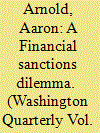

|
|
|
| 2 |
ID:
114436
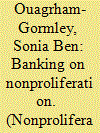

|
|
|
|
|
| Publication |
2012.
|
| Summary/Abstract |
In the past decade, governments have increasingly relied on financial sanctions to counter the proliferation of weapons of mass destruction. By targeting not only individuals and entities involved in illicit activities, but also banks that allow transactions to occur, financial sanctions were expected to stanch the flow of funds that support proliferation and compel compliance with international law-notably by Iran. Ten years later, Iran's nuclear program has advanced, calling into question the effectiveness of financial sanctions. Previous research evaluating the effectiveness of financial sanctions has focused on the impact of sanctions on the targeted country or on the enforcement of sanctions by the international community. Little attention has been devoted to their implementation by banks and government agencies. Based on interviews with US and European bank and government representatives, this article argues that the inefficiency of financial sanctions is due to shortcomings in training and information support from governments to financial institutions; governments on both sides of the Atlantic have provided little or no assistance to enable banks to identify patterns of proliferation financing and implement the sanctions regime. To transform financial sanctions into effective nonproliferation tools, governments need to play a greater role in their implementation.
|
|
|
|
|
|
|
|
|
|
|
|
|
|
|
|
| 3 |
ID:
116684
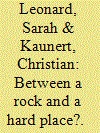

|
|
|
|
|
| Publication |
2012.
|
| Summary/Abstract |
This article focuses on the financial sanctions adopted by the European Union (EU) against individuals suspected of involvement in terrorist activities. This sanctions regime has been sharply criticised for its negative impact on human rights and has seen several judicial challenges before the European Courts. In contrast with most of the existing literature, which focuses on legal issues or examines the consequences of the EU financial sanctions, this article takes a step back to examine the reasons for which the EU decided to adopt these controversial financial sanctions in the first place. This article argues that it is mainly its commitment to 'UN-centred effective multilateralism' that has led the EU to adopt these financial sanctions measures in order to align itself with the UN financial sanctions regime. However, the Kadi landmark ruling of the European Court of Justice (ECJ) has challenged the pre-eminence of multilateralism over other considerations, such as the respect for human rights. As the Court of Justice prepares to hand down its second judgment in this case, the EU is left torn between its commitment to multilateralism and its commitment to human rights, which can be fully reconciled only if the UN sanctions regime meets the EU's human rights standards.
|
|
|
|
|
|
|
|
|
|
|
|
|
|
|
|
| 4 |
ID:
094973


|
|
|
|
|
| Publication |
2010.
|
| Summary/Abstract |
On May 25, 2009, North Korea conducted an underground test of a low-yield nuclear device, flaunting a Security Council resolution that had been passed in the wake of that state's first test two-and-a-half years before. The world waited 18 days for the Council to take concrete action in the form of a new round of sanctions. Although the measures passed were robust, some observers noted that China, with Russia, tried to 'dilute' them by making enforcement of financial sanctions non-mandatory, and complicating the practice of cargo inspections. Concerns were also raised about the extent to which China, wary about destabilizing North Korea and protecting its relations with Pyongyang, might be willing to implement the new provisions.1 More broadly, this case fits into a sequence of misgivings about China's participation in deliberations on a host of 'pariah' states, including North Korea, Iran, Myanmar, Sudan and Zimbabwe.
|
|
|
|
|
|
|
|
|
|
|
|
|
|
|
|
| 5 |
ID:
171081
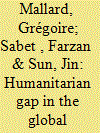

|
|
|
|
|
| Summary/Abstract |
Since the late 1990s, targeted sanctions and general humanitarian sanctions exemptions have aimed at avoiding the disastrous humanitarian consequences of comprehensive sanctions. In parallel, global banks in charge of administering the international trade of vital goods (food and medicine) have received guidance on how to implement risk-based approaches to avoid completely blockading sanctioned jurisdictions. But these efforts have failed. This article asks: Why has the governance of sanctions and sanctions exemption failed, and what can be done to fix the problem? It argues that a hybrid form of governance in the field of sanctions is responsible for current humanitarian problems. Based on more than eighty interviews with treasury officials, sanctions experts, compliance officers, and others, and taking the international trade of vital goods in Iran as an example, this article assesses various fixes to the governance failures and solutions to address the payment problems that exporters of vital goods in sanctioned jurisdictions face.
|
|
|
|
|
|
|
|
|
|
|
|
|
|
|
|
| 6 |
ID:
143002
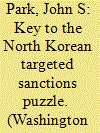

|
|
|
|
|
| Summary/Abstract |
At no point in the history of U.S. nonproliferation and counterproliferation policy have financial sanctions been so central to U.S. efforts to prevent or rollback the acquisition of nuclear weapons in countries such as North Korea and Iran. Despite this crucial role, financial sanctions have been examined almost solely from the sender's perspective, that is, the country imposing the sanctions. Few focused policy analyses have measured the effects of these instruments from the target's perspective.
|
|
|
|
|
|
|
|
|
|
|
|
|
|
|
|
| 7 |
ID:
153510
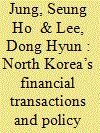

|
|
|
|
|
| Summary/Abstract |
This study investigates North Korea’s method of circumventing financial sanctions
based on a survey of 100 Chinese firms engaged in trade with North Korea, as
well as in-depth interviews with high-ranking North Korean defectors who have
professional experiences in the financial sector. Survey results indicate that North
Korea still prefers dollar–based financial transactions in trade settlements of a
certain size. In addition, this study categorizes North Korea’s circumventing
financial transactions by five methods: transactions via bank accounts under
borrowed names, cash depositories, paper companies, joint-venture banks, and
embassies. Lastly, this research presents policy implications to enhance the
effectiveness of financial sanctions.
|
|
|
|
|
|
|
|
|
|
|
|
|
|
|
|
| 8 |
ID:
090778
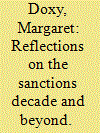

|
|
|
|
|
| Publication |
2009.
|
| Summary/Abstract |
When diplomatic, political, and/or economic sanctions are under consideration as an alternative or prequel to the use of force, there is now a wealth of experience to draw on. In the second half of the 20th century, continuing into the 21st, unilateral, regional and, in the post-Cold War period, United Nations sanctions have been extensively used. Indeed, the 1990s have been described as "the sanctions decade."
|
|
|
|
|
|
|
|
|
|
|
|
|
|
|
|
| 9 |
ID:
189841
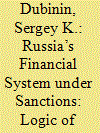

|
|
|
|
|
| Summary/Abstract |
External economic sanctions have created serious challenges to the stability
of Russia’s financial system. After the first emergency anti-crisis measures,
longer-term issues are coming to the fore. At this point, the main demand for
financial services is generated by the corporate sector. However companies
are seeing supply and value production chain disruptions. Uncertainty in
the business climate is fraught with systemic risks for both the budget and
the banking sectors of Russia. Overcoming them is a strategic goal of the
Russian government and the Central Bank. Both corporate and retail lending
risks have increased. The situation requires a reorganization of the financial
intermediaries in the bank loan and securities markets.
|
|
|
|
|
|
|
|
|
|
|
|
|
|
|
|
| 10 |
ID:
141771
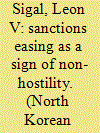

|
|
|
|
|
|
|
|